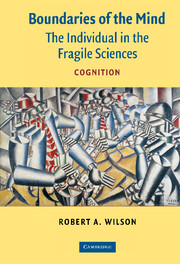Book contents
- Frontmatter
- Contents
- List of Tables and Figures
- Acknowledgments
- Boundaries of the Mind
- PART ONE DISCIPLINING THE INDIVIDUAL AND THE MIND
- PART TWO INDIVIDUALISM AND EXTERNALISM IN THE PHILOSOPHY OF MIND AND THE COGNITIVE SCIENCES
- PART THREE THINKING THROUGH AND BEYOND THE BODY
- 8 The Embedded Mind and Cognition
- 9 Expanding Consciousness
- 10 Intentionality and Phenomenology
- PART FOUR THE COGNITIVE METAPHOR IN THE BIOLOGICAL AND SOCIAL SCIENCES
- Notes
- References
- Index
10 - Intentionality and Phenomenology
Published online by Cambridge University Press: 02 December 2009
- Frontmatter
- Contents
- List of Tables and Figures
- Acknowledgments
- Boundaries of the Mind
- PART ONE DISCIPLINING THE INDIVIDUAL AND THE MIND
- PART TWO INDIVIDUALISM AND EXTERNALISM IN THE PHILOSOPHY OF MIND AND THE COGNITIVE SCIENCES
- PART THREE THINKING THROUGH AND BEYOND THE BODY
- 8 The Embedded Mind and Cognition
- 9 Expanding Consciousness
- 10 Intentionality and Phenomenology
- PART FOUR THE COGNITIVE METAPHOR IN THE BIOLOGICAL AND SOCIAL SCIENCES
- Notes
- References
- Index
Summary
THE RELATIONSHIP BETWEEN INTENTIONALITY AND PHENOMENOLOGY
Traditionally, postbehaviorist philosophy of mind and cognitive science has proceeded on the assumption that intentionality and phenomenology can most profitably be treated independently or separately from one another. The intentional and the phenomenal have often been viewed as the two fundamental categories of the mental within the philosophy of mind, with more specific types of mental states falling under one or the other of them. Belief and thought are paradigms of the intentional, and pain and bodily sensations paradigms of the phenomenal. Even when this divide between the intentional and the phenomenal has not been treated as a mutually exclusive categorization scheme for thinking about the constituents of the mind, intentional and phenomenal aspects of particular types of mental states remain distinguished and treated in separation from one another. Terence Horgan and John Tienson have called this general position separatism.
These forms of separatism about the intentional and the phenomenal likely have no single cause. For some, separatism makes sense because intentionality is thought to be significantly more tractable than phenomenology. “Look,” one might say, “figuring out how the mind works is really hard. Consciousness is a complete mystery. But we at least have some inkling about intentionality and mental representation. So let's work that out first.” Hence, the explosion of work on causal, informational, and teleological theories of content, and the attention that the individualism-externalism debate has generated over the past twenty-five years.
- Type
- Chapter
- Information
- Boundaries of the MindThe Individual in the Fragile Sciences - Cognition, pp. 242 - 262Publisher: Cambridge University PressPrint publication year: 2004



